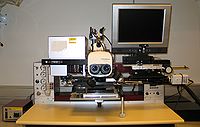Specific Process Knowledge/Back-end processing/Die Bonder: Difference between revisions
| Line 21: | Line 21: | ||
== Flip-chip bonder (glue attachment) == | == Flip-chip bonder (glue attachment) == | ||
The flip chip bonder can be used to place chips on a substrate with high precision. This way electrical contacts can be made between chip and substrate. With a dispensing tool small amounts of solder paste or glue is dispensed on the substrate with high accuracy. The substrate could for example be a printed circuit board (PCB). After some experience with the machine, it is possible to place dots with different shapes and sizes on the surface. With a placement tool a chip can then be picked up upside down and by the use of the camera unit, it is possible to align the contacts on the chip with the solder/glue dots on the contacts on the substrate before joining the two surfaces with a light pressure. The stack is cured and an underfill glue can be dispensed to enhance the bonding strength between chip and substrate. | |||
[[image:Flip_chip_Bonder_dr_Tresky.jpg|200x200px|right|thumb|The Flip chip bonder]] | [[image:Flip_chip_Bonder_dr_Tresky.jpg|200x200px|right|thumb|The Flip chip bonder]] | ||
Revision as of 15:31, 5 February 2014
Feedback to this page: click here
Die bonder (eutectic metal soldering)
The Cammax EDB80 Die bonder is for placing and soldering dies onto a package or substrate.
The user manuals, user APVs, technical information and contact information can be found in LabManager:

Process information
Flip-chip bonder (glue attachment)
The flip chip bonder can be used to place chips on a substrate with high precision. This way electrical contacts can be made between chip and substrate. With a dispensing tool small amounts of solder paste or glue is dispensed on the substrate with high accuracy. The substrate could for example be a printed circuit board (PCB). After some experience with the machine, it is possible to place dots with different shapes and sizes on the surface. With a placement tool a chip can then be picked up upside down and by the use of the camera unit, it is possible to align the contacts on the chip with the solder/glue dots on the contacts on the substrate before joining the two surfaces with a light pressure. The stack is cured and an underfill glue can be dispensed to enhance the bonding strength between chip and substrate.

The user manuals, user APVs, technical information and contact information can be found in LabManager:
Flip-chip Bonder in LabManager
| Equipment | Die bonder | Flip-chip bonder | |
|---|---|---|---|
| Purpose |
|
| |
| Performance |
|
| |
| Substrates | Allowed materials |
|
|
